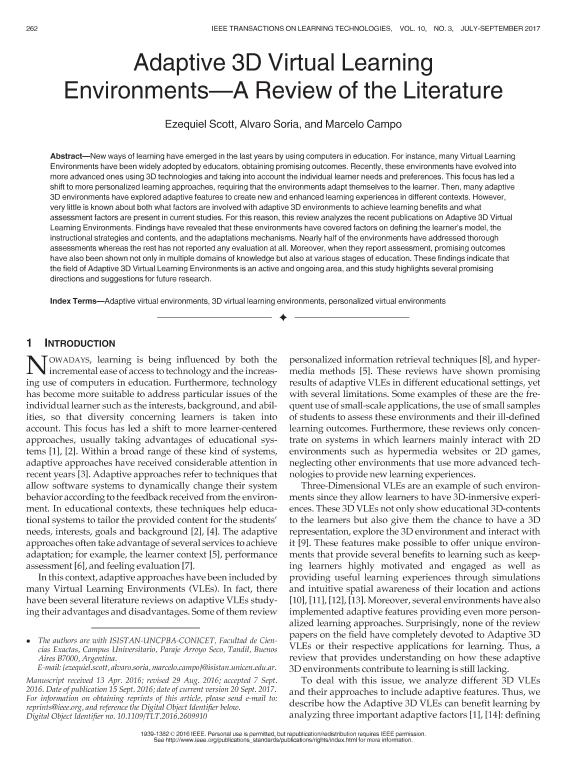Artículo
Adaptive 3D Virtual Learning Environments - A Review of the Literature
Fecha de publicación:
07/2017
Editorial:
Institute of Electrical and Electronics Engineers
Revista:
IEEE Transactions on Learning Technologies
ISSN:
1939-1382
Idioma:
Inglés
Tipo de recurso:
Artículo publicado
Clasificación temática:
Resumen
New ways of learning have emerged in the last years by using computers in education. For instance, many Virtual Learning Environments have been widely adopted by educators, obtaining promising outcomes. Recently, these environments have evolved into more advanced ones using 3D technologies and taking into account the individual learner needs and preferences. This focus has led a shift to more personalized learning approaches, requiring that the environments adapt themselves to the learner. Then, many adaptive 3D environments have explored adaptive features to create new and enhanced learning experiences in different contexts. However, very little is known about both what factors are involved with adaptive 3D environments to achieve learning benefits and what assessment factors are present in current studies. For this reason, this review analyzes the recent publications on Adaptive 3D Virtual Learning Environments. Findings have revealed that these environments have covered factors on defining the learner's model, the instructional strategies and contents, and the adaptations mechanisms. Nearly half of the environments have addressed thorough assessments whereas the rest has not reported any evaluation at all. Moreover, when they report assessment, promising outcomes have also been shown not only in multiple domains of knowledge but also at various stages of education. These findings indicate that the field of Adaptive 3D Virtual Learning Environments is an active and ongoing area, and this study highlights several promising directions and suggestions for future research.
Archivos asociados
Licencia
Identificadores
Colecciones
Articulos(ISISTAN)
Articulos de INSTITUTO SUPERIOR DE INGENIERIA DEL SOFTWARE
Articulos de INSTITUTO SUPERIOR DE INGENIERIA DEL SOFTWARE
Citación
Scott, Mario Ezequiel; Soria, Alvaro; Campo, Marcelo Ricardo; Adaptive 3D Virtual Learning Environments - A Review of the Literature; Institute of Electrical and Electronics Engineers; IEEE Transactions on Learning Technologies; 10; 3; 7-2017; 262-276
Compartir
Altmétricas




